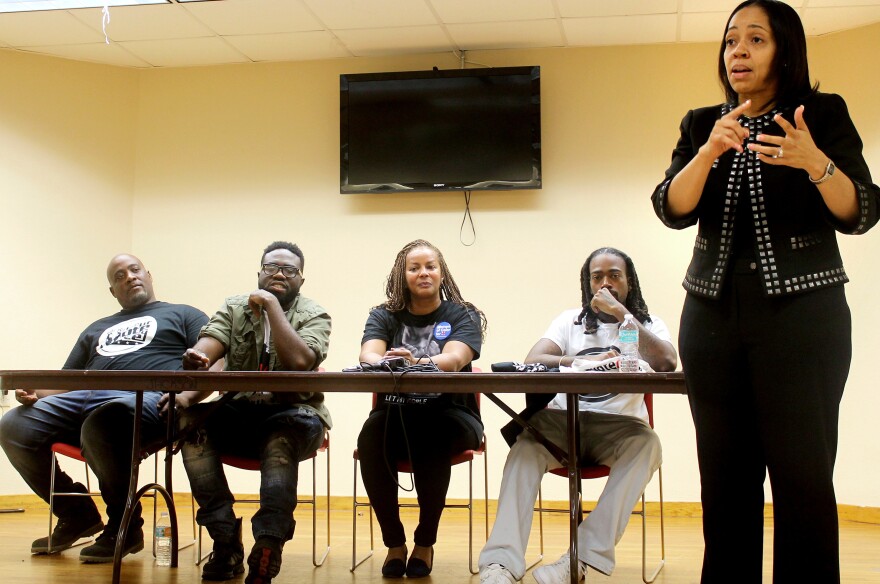While the race at the top of the ballot between Donald Trump and Hillary Clinton consumes the nation's attention, a series of consequential district attorney races around the country could reshape the criminal justice system from the ground up.
One of those races is in the Orlando area, in one of Florida's largest judicial circuits. With no general election opponent, Aramis Ayala is highly likely to become Florida's first black state's attorney in an area with 1.3 million residents. She'll have say over which police arrests turn into cases, which cases go to trial, and who goes to prison — and for how long.
Ayala's bid has received support from a nationwide campaign bankrolled by a group dedicated to electing a more diverse slate of prosecutors.
In the August 30 Democratic primary, the 41-year-old beat her opponent and former boss, Jeff Ashton. Ashton is well known in the state for prosecuting Casey Anthony and the Florida A&M University band in its hazing trial.
A Changing Time For Prosecutors
Ayala's bid for office comes at a time when the Black Lives Matter movement has highlighted police violence against minorities and when federal and state politicians have sought to reform the criminal justice system.
"Prosecution has been known as, 'We have evidence, we proved their case, Done,'" she said. "The mindset of the people who just wanted more integrity, more transparency, more consistency, higher levels of justice, they opened their arms to my campaign."
Her campaign has been centered on shifting the culture of the prosecutor's office by strengthening the relationship between law enforcement and communities of color.
"The image of a prosecutor appears to be against people of color. We focus a lot on the person who's committing the crime and his and her race versus looking at the person who the crime has been committed against. Most crime is not cross-racial," she said.

Given the power of prosecutors to plea bargain with suspects, file lesser charges and ask for more lenient sentencing, Ayala hopes to address racial disparities in criminal justice.
"There are black and brown people who receive disparate treatment the way that the law is set up, period."
For Desmond Meade, who heads the Florida Rights Restoration Coalition, that perspective is historically significant in a state with the nation's highest concentration of men and women in prison — many black and Latino.
"When you talk about an office that's probably the most powerful office in a local municipality, hopefully with an African American leading the charge, we can have a better representation of what this justice system is about," he said.
Rising stars
Across the country, candidates like Ayala are challenging veteran prosecutors. In Illinois, Kim Foxx defeated incumbent state's attorney Anita Alvarez to become the Cook County prosecutor. She will prosecute cases involving the highly scrutinized Chicago Police Department. In New Mexico, Democrat Raul Torrez defeated his opponent in the district attorney primary.
According to civil rights attorney Natalie Jackson, who represented the family of Trayvon Martin during the George Zimmerman trial, this represents a paradigm shift in public opinion and activism.
"Young people of color, they're saying, 'If we cannot get fairness on the outside, then we're going to go inside these institutions and we're going to become these institutions," she said. "We're seeing an inclusion of people who are saying, 'Listen, the American agenda is not a Christian white male agenda, it is a more diverse agenda and we need more inclusion."
Support from progressives
Liberals pushing for criminal justice reform across the country are backing candidates like Aramis Ayala. Billionaire George Soros's political action committee reportedly spent more than $620,000 in attack ads against Ayala's opponent, Ashton. Nationwide, he has spent reported more than $9 million to help other candidates of color in similar races.
That may have helped Ayala win, said Buddy Jacobs, who has been with the Florida Prosecuting Attorneys Association since 1970, but he does not expect her likely election to spur major change in Florida.
"Reform of the criminal justice system is dependent upon the state legislature of the states of this country. And so, whatever, the representatives of the people decide the law would be, that's what state attorneys enforce," he said.
Copyright 2020 WMFE. To see more, visit WMFE. 9(MDAxMzY2MjQ0MDEyMzcyMDQ5MzBhZWU5NA001))


